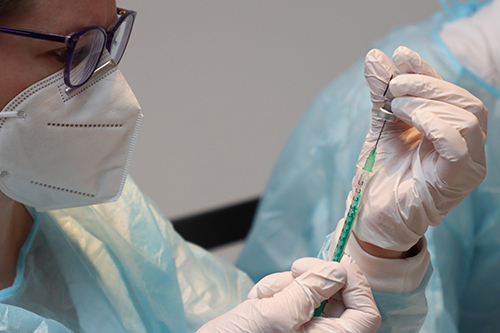The public’s preference for the AstraZeneca Covid vaccine has declined since last month, and belief that it causes blood clots has increased – but despite this, vaccine confidence is higher than it was towards the end of 2020, and there has been a big rise in the proportion of people who say they want to be vaccinated as soon as possible, according to a new study.
The research, by the University of Bristol, King’s College London and the NIHR Health Protection Research Unit in Emergency Preparedness and Response, is based on a survey of 4,896 UK adults aged 18 to 75 conducted between 1 and 16 April 2021.
This follows up a study in November and December 2020 and tracks some of the same individuals to see how their views have changed and why.
Seventeen per cent of the public now say they’d prefer to have the AZ vaccine, if they had a choice of any – down from 24% towards the end of March.
And 23% of people now believe the AZ vaccine causes blood clots – up from 13% last month. But the public are still most likely to say this claim is false (39%) or that they don’t know whether it’s true (38%).
And within this latest survey wave, there is a big difference in beliefs before and after the MHRA announced there was a possible link between the vaccine and extremely rare blood clots on 7 April: 17% of those interviewed in the first week of that month thought this claim was true, compared with 31% interviewed after.
There are also big differences in views on this issue among different groups with Vaccine-hesitant people (57%) are more than twice as likely as both the public overall (23%) and the vaccine-confident (23%) to believe the AZ vaccine causes blood clots.
Meanwhile those who have received an invitation to get vaccinated but not taken it up are also much more likely to believe the vaccine causes clots: 54% think this claim is true, compared with 30% of those who have received their invitation and plan on attending soon.
A growing belief that the UK’s main Covid-19 vaccine is linked to blood clots has not dented overall levels of confidence in vaccines in general.
Eighty-one per cent now say vaccines are safe, compared with 73% who said the same towards the end of 2020. This include 39% who strongly agree that this is the case – up from 30%.
There has been a similar change in views of how well vaccines work: 86% say they are effective, an increase from 79% in Nov/Dec 2020. And the proportion who strongly feel this way has risen from 38% to 47%.
The clear top reason for switching from not wanting to get the vaccine to wanting to be vaccinated was the wish to go on holiday, including the possibility of vaccine passports, mentioned by 18% of switchers.
The top two reasons given by those who were uncertain and are now sure they want the vaccine is that it is the ‘right thing to do’ (19%) and to protect their own family or others in general (12%).
Dr Siobhan McAndrew, Senior Lecturer in Quantitative Social Science at the University of Bristol, said: “These findings shed light on different aspects of coronavirus vaccination hesitancy: concern regarding long-term side effects, vaccine effectiveness, vaccine ingredients, effectiveness and speed of regulatory clearance stand out. Such concerns continue for a hard core of the vaccine-opposed.
“The public health challenge remains complex: to respond to the concerns and information needs of a diverse population, to support the pro-vaccine social norm, and to offer meaningful reasons to take up the vaccine to those who remain unconvinced.”







